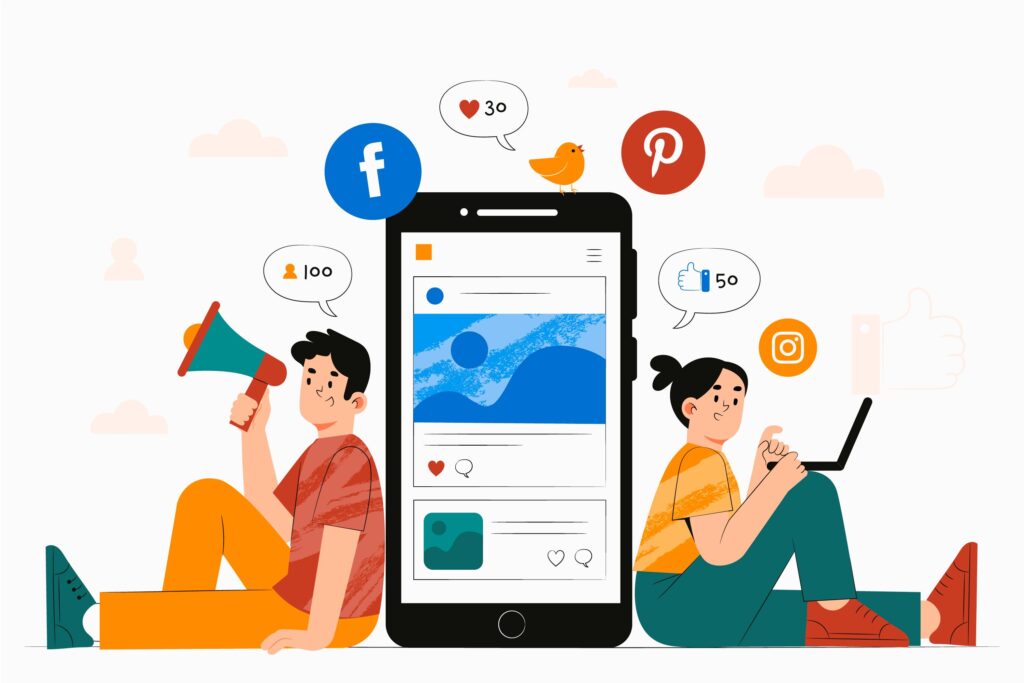
Social media has become an influential platform that shapes trends, behaviors, and even lifestyles. Among these trends, social media challenges related to weight loss have surged in popularity. While some of these challenges inspire healthier lifestyles and provide motivation, others can lead to harmful practices and dangerous outcomes. This blog post will explore the dual nature of social media challenges and their influence on healthy versus harmful weight loss practices.
In recent years, social media has become a powerful tool for sharing fitness tips, diet trends, and weight loss journeys. Platforms like Instagram, TikTok, and YouTube are filled with various weight loss challenges that claim to transform your body in a matter of weeks. These challenges often attract millions of participants, fueled by the desire to join a community, stay motivated, and share their own progress.
However, while some of these challenges promote healthy habits and positive lifestyle changes, others can encourage potentially harmful practices. The allure of quick results and the influence of viral trends can sometimes lead individuals to adopt extreme, unsustainable, or even dangerous methods. The question then arises: are social media challenges a beneficial way to promote health and fitness, or do they do more harm than good?
In this blog post, we will explore the influence of social media challenges on weight loss practices, examining both their potential benefits and risks. We’ll look at the role of influencers, the psychological impact these challenges can have, and how to navigate this trend to make informed and healthy choices.
The Appeal of Social Media Challenges
The appeal of social media weight loss challenges is rooted in their ability to create a sense of community and accountability. With hashtags, shared experiences, and visible results, these challenges can provide the motivation people need to kickstart their weight loss journeys. For many, the opportunity to engage with like-minded individuals, receive positive reinforcement, and share progress fosters a sense of belonging that can be highly motivating.
Pros of Social Media Challenges:
- Community Support: Users often find encouragement and motivation by joining groups or following hashtags that connect them with others working towards similar goals.
- Accountability: Posting updates and progress photos keeps participants accountable, which can aid in maintaining consistency.
- Inspirational Stories: Personal stories and before-and-after transformations can provide genuine inspiration and prove that healthy weight loss is attainable.
The Dark Side of Social Media Challenges
While many social media challenges promote positive behavior, not all of them are based on safe or healthy practices. The unregulated nature of these platforms means that anyone can create a challenge without ensuring it aligns with medical or nutritional guidelines. Some challenges promote rapid, unsustainable weight loss, while others endorse practices that can lead to disordered eating or other health risks.
Cons of Social Media Challenges:
- Unrealistic Standards: Many challenges showcase highly curated and often unrealistic transformations, which can lead to feelings of inadequacy and body image issues.
- Harmful Advice: Not all influencers or challenge creators are qualified health professionals. Misguided advice can result in participants engaging in extreme calorie restriction or unbalanced diets.
- Pressure to Conform: The desire for likes and validation can drive individuals to participate in trends that may not be suitable for their health or body type.
Examples of Healthy Social Media Challenges

When conducted responsibly, social media challenges can promote sustainable weight loss and healthy habits. Here are some examples of challenges that encourage well-rounded, balanced approaches:
- 30-Day Fitness Challenges: These challenges typically involve short daily workouts that progress in difficulty over time. The aim is to build consistency, encourage physical activity, and introduce participants to various forms of exercise.
- Benefits: Promotes daily movement and builds discipline without overexertion.
- Risks: Should be paired with rest days or modifications to avoid injury.
- Hydration Challenges: Drinking more water is a simple yet effective way to support overall health and aid in weight loss. These challenges encourage participants to drink a set amount of water each day, fostering a habit that has numerous benefits.
- Benefits: Helps improve metabolism, skin health, and energy levels.
- Risks: Minimal, but participants should avoid excessive water consumption, which can lead to hyponatremia.
- Balanced Eating Challenges: These involve focusing on whole, nutrient-dense foods and limiting processed options. Challenges may include cooking at home or adopting a more plant-based diet for a set period.
- Benefits: Encourages healthy, sustainable eating habits.
- Risks: May require guidance for those unfamiliar with nutritional balance to ensure adequate intake of essential nutrients.
Examples of Harmful Social Media Challenges

Conversely, there are numerous examples of challenges that encourage rapid, unsustainable, or even dangerous weight loss practices:
- Extreme Detox or Fasting Challenges: These often promote liquid-only diets or severe calorie restriction for quick weight loss.
- Risks: These challenges can lead to nutrient deficiencies, muscle loss, and metabolic damage. Prolonged use can result in serious health consequences, including heart issues.
- Unverified Diet Trends: Social media is filled with diet trends that lack scientific backing, such as extreme low-carb challenges or fad diets that cut out entire food groups.
- Risks: Following unverified dietary advice can disrupt metabolism, lead to poor long-term eating habits, and increase the risk of binge eating.
- Over-Exercise Challenges: While being active is important, challenges that push for excessive exercise without adequate rest can lead to overtraining syndrome.
- Risks: Overtraining can cause fatigue, decreased performance, injury, and increased cortisol levels, which may hinder weight loss.
Recognizing Red Flags in Weight Loss Challenges
To safely participate in social media weight loss challenges, it is crucial to recognize potential red flags:
- Lack of Professional Endorsement: Challenges without input from health or fitness professionals may not be based on safe practices.
- Promises of Rapid Weight Loss: If a challenge claims you will lose a significant amount of weight in a short time, it is likely unsustainable and potentially harmful.
- Extreme Restrictions: Avoid challenges that suggest cutting out entire food groups, extremely low-calorie intake, or prolonged fasting.
Tips for Choosing Healthy Challenges
- Check for Expert Recommendations: Look for challenges that are backed by nutritionists, dietitians, or certified fitness trainers.
- Focus on Sustainability: The best challenges emphasize gradual progress rather than rapid results.
- Listen to Your Body: If a challenge causes excessive fatigue, dizziness, or any health concerns, stop participating and consult a professional.
- Include Rest Days: Opt for challenges that incorporate rest or active recovery to promote overall well-being.
- Personalize Your Approach: Adapt challenges to suit your body type, fitness level, and dietary needs.
How to Use Social Media Wisely for Weight Loss
Social media can be a great resource for learning and inspiration if used thoughtfully:
- Follow Reputable Sources: Seek out content from registered dietitians, fitness trainers, and health organizations.
- Be Skeptical of Trends: Just because something is popular does not mean it is effective or safe.
- Engage Mindfully: Participate in online discussions that promote body positivity and realistic goals.
The Role of Influencers in Shaping Weight Loss Trends
Influencers play a significant role in the popularity of social media challenges. With millions of followers, influencers have the power to shape opinions and behaviors. When fitness influencers advocate for challenges rooted in balanced eating and regular exercise, they contribute positively to public health. However, when influencers promote extreme, unsustainable methods, their reach can contribute to harmful behaviors among their audiences.
Positive Influences:
- Educational Content: Some influencers share scientifically-backed advice and collaborate with experts to create challenges that support holistic health.
- Transparency: Responsible influencers often show the ups and downs of their own weight loss journeys, setting realistic expectations for followers.
- Motivational Power: Encouraging stories and consistent content can motivate individuals to make positive lifestyle changes.
Negative Influences:
- Unrealistic Body Image: Many influencers share highly edited photos that set unattainable beauty standards, leading to body dissatisfaction.
- Sponsorships and Promoted Products: Influencers may endorse weight loss supplements or diet products that are ineffective or harmful, driven by lucrative sponsorships rather than genuine health benefits.
- Overemphasis on Appearance: The focus on aesthetics rather than overall health can foster a harmful mindset that prioritizes weight over well-being.
The Psychological Impact of Social Media Challenges

Engaging with social media challenges can impact participants’ mental health both positively and negatively. While the sense of community can promote feelings of belonging, the comparison culture inherent in social media can lead to anxiety, low self-esteem, and disordered eating patterns.
Positive Psychological Effects:
- Boost in Motivation: Seeing others succeed can create a ripple effect of motivation and drive participants to pursue their own health goals.
- Accountability and Routine Building: Consistent participation in challenges can help establish new, healthy routines that contribute to long-term success.
Negative Psychological Effects:
- Comparison Trap: Constantly comparing oneself to others’ curated posts can diminish self-confidence and create feelings of inadequacy.
- Perfectionism and Stress: The pressure to post perfect updates can lead to stress and a heightened sense of failure if results don’t meet expectations.
How to Create Your Own Healthy Social Media Challenge
Creating a balanced, healthy challenge that others can follow can be a rewarding way to inspire positive change. Here’s how to structure a challenge that promotes sustainable and safe practices:
- Collaborate with Professionals: Work with dietitians, fitness trainers, or mental health experts to design a challenge that is evidence-based.
- Set Realistic Goals: Design challenges that encourage gradual progress rather than immediate, dramatic results.
- Incorporate Education: Share resources and explain the benefits behind each step of the challenge, empowering participants to make informed decisions.
- Emphasize Holistic Health: Include elements that address mental well-being, such as mindfulness practices or gratitude journaling.
- Promote Flexibility: Offer modifications for different fitness levels and dietary needs to make the challenge accessible to a wider audience.
Redefining Success Beyond Weight Loss
The focus of many social media challenges is purely weight-based, but it’s essential to redefine success in broader terms. Emphasizing overall health and well-being, such as increased energy, improved sleep, better mood, and stronger muscles, can shift the narrative towards a more positive outlook.
Key Indicators of Success:
- Enhanced Strength and Endurance: Tracking fitness improvements, like increased stamina or lifting heavier weights.
- Better Relationship with Food: Learning to view food as fuel and enjoyment, not as something to fear or restrict.
- Mental Clarity and Confidence: Feeling more focused, happier, and confident as a result of balanced eating and exercise.
Conclusion
Social media weight loss challenges can be double-edged swords. While they can offer motivation, community support, and fresh ideas for weight loss, they also carry risks when promoting extreme or unsustainable practices. By understanding the potential benefits and dangers, you can make informed decisions and engage with social media in a way that supports healthy, long-term weight loss. Always prioritize your health, listen to your body, and consult professionals when needed.
When approached with mindfulness and balance, social media can be a tool for positive change rather than a source of harm. Choose challenges that emphasize safety, well-being, and sustainability, and remember that your journey is unique—no social media trend should compromise your health or happiness.
FAQs
1. What are social media weight loss challenges? Social media weight loss challenges are programs or trends shared on platforms like Instagram, TikTok, and Facebook where users commit to specific diets, workouts, or lifestyle changes for a set period. Participants often post updates and results, creating a sense of community and accountability.
2. Are social media challenges safe for weight loss? Not all social media challenges are safe. While some promote healthy, sustainable practices with guidance from experts, others may encourage extreme diets or intense exercise regimens that can be harmful. It’s essential to evaluate the source and method of any challenge before participating.
3. How can I identify if a social media challenge is healthy? Look for challenges that prioritize gradual progress, include input from health professionals, and emphasize overall well-being rather than just appearance. Avoid challenges that promise quick results, rely on supplements, or promote restrictive eating.
4. What are the positive impacts of joining a social media challenge? When designed responsibly, social media challenges can boost motivation, create a supportive community, help establish healthy habits, and provide a sense of accomplishment.
5. What are the potential negative effects of social media weight loss challenges? The potential downsides include body image issues, increased anxiety, comparison stress, and the risk of following advice that isn’t backed by science or medical professionals. These effects can lead to unhealthy behaviors and disordered eating patterns.
6. How do influencers affect social media weight loss challenges? Influencers can play a big role in setting trends. Those who collaborate with experts and share transparent, balanced journeys can inspire positive changes. However, influencers who promote quick fixes or heavily edited content can perpetuate unrealistic standards and harmful practices.
7. Can social media challenges affect mental health? Yes, participating in social media challenges can have both positive and negative impacts on mental health. While they can promote motivation and community, they may also increase feelings of inadequacy, comparison stress, and pressure to meet unrealistic standards.
8. How can I create a safe and healthy social media weight loss challenge? Collaborate with nutritionists, fitness experts, or mental health professionals to design the challenge. Make sure it focuses on gradual progress, incorporates education, and encourages a well-rounded approach to health.
9. Is it okay to follow a weight loss challenge without consulting a doctor? It’s best to consult a doctor or healthcare professional before starting any new diet or exercise program, especially if it involves significant changes. This helps ensure that the challenge aligns with your personal health needs and goals.
10. What should I do if a social media challenge is making me feel anxious or inadequate? If you find that a social media challenge is negatively impacting your mental health, it’s important to take a step back. Limit your exposure, unfollow accounts that trigger anxiety, and remind yourself that your journey is unique. Seeking support from friends, family, or a mental health professional can also be beneficial.




Tarabya su kaçağı tespiti Profesyonel bir ekip, su kaçağını hemen çözdüler. https://kryza.network/ustaelektrikci
Çekmeköy su kaçağı tespiti Küçükçekmece’deki evimizdeki su kaçağını kısa sürede tespit ettiler. Kesinlikle tavsiye ediyorum. https://hrvatskinogomet.com/ustaelektrikci
hızlı su kaçak tespiti İlk kez bu kadar hızlı bir hizmet aldım, tavsiye ederim! https://blacksocially.com/ustaelektrikci
Pingback: The Influence of Social Media on Weight Loss Trends: From Passing Fads to Trustworthy Guidance -